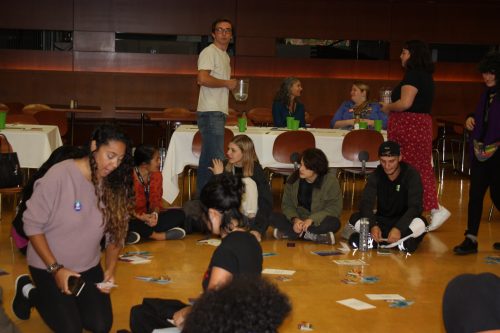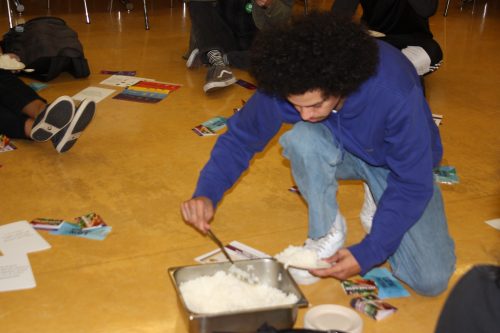This content was published: November 8, 2019. Phone numbers, email addresses, and other information may have changed.
OXFAM Hunger Banquet shows what it’s like to be hungry through inequitable serving
Photos and Story by Sarah Rose Evans

Attendees assigned to the low-income category sat on the floor, served themselves out of a communal bin, and each got half a cup of rice.
In October, Portland Community College’s Anthropology Program and food insecurity programs across the college hosted the first PCC OXFAM Hunger Banquet in 15 years. Held at the Sylvania Campus, students, faculty, staff and administrators came together to share a meal and learn more about poverty and hunger.
The event included a real-world look at the inequities of food security. When attendees arrived, they received a randomly assigned socioeconomic status, which determined the type and quantity of food they would receive.
Those assigned to the low-income category sat on the floor, served themselves out of a communal bin, and each got half a cup of rice.
Middle-income participants got a seat at a table and a meal of rice and beans.
The high-income guests sat at a table with tablecloths and cutlery, where they were served a three-course dinner by waitstaff.
The one percent, which was two people, were separated from the rest of the guests at an intimate table with linens, cutlery, flowers, and personal waitstaff. They were served a four-course meal.
“It’s really hard to eat,” said Tricia Brand, who had drawn a high-income status at the check-in. As PCC’s Chief Diversity Officer, she works to support diversity, equity, and inclusion across the district. She struggled to finish her salad as others sat on the floor with their plates of rice. While they ate, she strategized with a high-income student about ways they could redistribute food to the others.
“It’s a really powerful experience,” said event organizer and anthropology faculty Michele Wilson. “We were incredibly humbled by the turn-out and support for our work.”
The food distribution is based on the latest statistics about poverty around the world, with 20 percent in the high-income tier, 30 percent in the middle-income group, and 50% in the low-income tier.
“The Oxfam Hunger Banquet is a wonderful example of how our faculty and students work together to thought-partner on large scale issues that deeply impact our community,” said Katy Ho, the vice president of Academic Affairs. She was assigned to the low-income group, and ate rice on the floor during the event.

Those assigned to the low-income category sat on the floor, served themselves out of a communal bin, and each got half a cup of rice.
The event also highlighted issues closer to home: after the meal, participants learned more about hunger here at PCC, sharing that nearly two-thirds of students experience food insecurity.
“The event allowed for conversations around food insecurity to be broached in an intentional and creative way, and I was so grateful to be able to experience it alongside students, faculty, and staff,” Ho continued. “I left feeling that our collective understanding deepened and that we all experienced individual calls to action.”
Part of the presentation for the evening included research done by Wilson’s “Intro to Cultural Anthropology” class from last winter term. One student shared, “Many food insecure students are faced with issues of embarrassment and shame on a daily basis and are reluctant to confide in peers for fear of stigma and ostracism.”
Another said, “It wasn’t always comfortable, but talking to other students showed me that I am not alone. So many of us don’t eat and it’s really, really hard.”
Panther Pantry locations:
Cascade: Student Union ASPCC Information desk.
Rock Creek: Room 113, Building 5.
Southeast: Room 105, Mount Tabor Hall.
Sylvania: Room 221, College Center.
For hours of operation or to donate canned goods to the pantries, contact the Student Leadership managers at each campus:
Kendi Esary, Cascade Campus
Cortney Tassone, Rock Creek Campus
DeLinda Martin-Huggins, Southeast Campus
Stephen Arthur, Sylvania Campus
Donations can also be made to the pantries through buying food and rounding up the purchase at any campus dining center, which funds the food voucher program.
